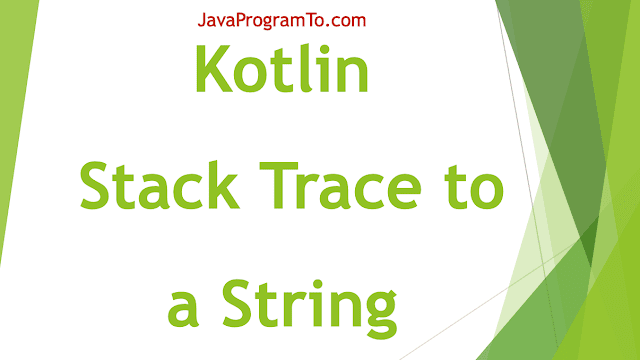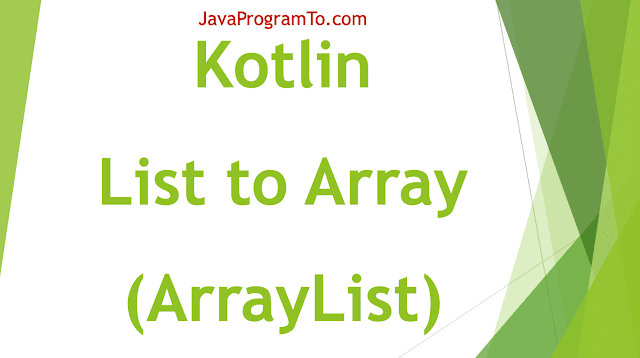1. Overview
In this tutorial, We'll learn how to convert the List to Map in Kotlin programming. Let us explore the different ways to do this conversion.
Kotlin provides a set of methods for the functionality.
- associate()
- associateBy()
- map() and toMap()
- Running for loop and set to map
First created a Website class with site name and its rank value. Next, Created and added 4 objects to list.
Converting the List to Map is shown in the below sections with example programs.
2. Kotlin List to Map with associate() method
Use associate() method to convert the List of object to Map with the needed type for key, value pairs.
Pass the Pair() object with the key, value pair object and internally it iterates over the loop.
package com.javaprogramto.kotlin.collections.list.map
data class Website(var site: String, var rank: Long);
fun main(args: Array<String>) {
var websiteranks: List<Website> = listOf(
Website("google.com", 1),
Website("youtube.com", 2),
Website("amazon.com", 3),
Website("yahoo.com", 4)
);
println("List values : $websiteranks")
val finalMap : Map<String, Long> = websiteranks.associate { Pair(it.site, it.rank) };
println("Final map from list using associate : $finalMap")
val mapValueCustomType : Map<String, Website> = websiteranks.associate { Pair(it.site, it) };
println("Map value as custom type using associate : $mapValueCustomType")
}
Output:
List values : [Website(site=google.com, rank=1), Website(site=youtube.com, rank=2), Website(site=amazon.com, rank=3), Website(site=yahoo.com, rank=4)]
Final map from list using associate : {google.com=1, youtube.com=2, amazon.com=3, yahoo.com=4}
Map value as custom type using associate : {google.com=Website(site=google.com, rank=1), youtube.com=Website(site=youtube.com, rank=2), amazon.com=Website(site=amazon.com, rank=3), yahoo.com=Website(site=yahoo.com, rank=4)}
3. Kotlin List to Map with associateBy() method
Next, use the associateBy() method to convert list to map in another way.
package com.javaprogramto.kotlin.collections.list.map
fun main(args: Array<String>){
var websiteranks: List<Website> = listOf(
Website("google.com", 1),
Website("youtube.com", 2),
Website("amazon.com", 3),
Website("yahoo.com", 4)
);
val finalMap : Map<String, Long> = websiteranks.associateBy({it.site}, {it.rank});
println("Final map from list using associateBy: $finalMap")
val mapValueCustomType : Map<String, Website> = websiteranks.associateBy({it.site}, {it})
println("Map value as custom type using associateBy : $mapValueCustomType")
}
Output:
Final map from list using associateBy: {google.com=1, youtube.com=2, amazon.com=3, yahoo.com=4}
Map value as custom type using associateBy : {google.com=Website(site=google.com, rank=1), youtube.com=Website(site=youtube.com, rank=2), amazon.com=Website(site=amazon.com, rank=3), yahoo.com=Website(site=yahoo.com, rank=4)}
4. Kotlin List to Map with map() and toMap() methods
Next, use map() and toMap() methods on the list object.
map() method returns ArrayList.
toMap() method returns Map object.
package com.javaprogramto.kotlin.collections.list.map
// kotlin program to convert list to map using map() and toMap() methods.
fun main(args: Array<String>){
var websiteranks: List<Website> = listOf(
Website("google.com", 1),
Website("youtube.com", 2),
Website("amazon.com", 3),
Website("yahoo.com", 4)
);
val finalMap : Map<Long, String> = websiteranks.map { it.rank to it.site }.toMap()
println("Final map from list using map() and toMap() methods : $finalMap")
val mapValueCustomType : Map<String, Website> = websiteranks.map{it.site to it}.toMap();
println("Map value as custom type using map() and toMap() methods : $mapValueCustomType")
}
Output:
Final map from list using map() and toMap() methods : {1=google.com, 2=youtube.com, 3=amazon.com, 4=yahoo.com}
Map value as custom type using map() and toMap() methods : {google.com=Website(site=google.com, rank=1), youtube.com=Website(site=youtube.com, rank=2), amazon.com=Website(site=amazon.com, rank=3), yahoo.com=Website(site=yahoo.com, rank=4)}
5. Kotlin List to Map Using Loops
Finally, Look at the conversion to Map using for loops with normal iteration. In this way, we get the each value from list and set to a new map.
// kotlin program to convert list to map using for each loop
fun main(args: Array<String>) {
var websiteranks: List<Website> = listOf(
Website("google.com", 1),
Website("youtube.com", 2),
Website("amazon.com", 3),
Website("yahoo.com", 4)
);
val finalMap: MutableMap<String, Long> = HashMap();
for (website in websiteranks) {
finalMap[website.site] = website.rank;
}
println("Map from list using custom iterating the list with for loop : $finalMap")
}
Output:
Map from list using custom iterating the list with for loop : {google.com=1, amazon.com=3, yahoo.com=4, youtube.com=2}
6. Conclusion
In this article, we have seen the different ways to do conversion from List to Map.
Among all methods, associate() method is the right choice and mostly used in the real time applications.
Next, use toMap() method if you are iterating the list and doing some other operations.
But, toMap() method is more readable.





